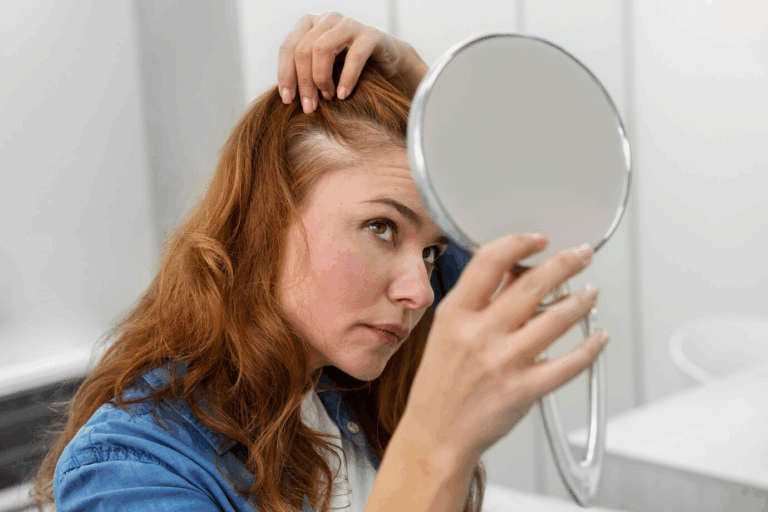Regardless of age or gender, hair loss is a widespread issue that impacts millions of people worldwide. While medical issues and genetics are well-known causes, stress is a crucial but frequently disregarded component. Growing scientific data supports the link between long-term stress and hair loss, emphasizing how psychological stressors can physically materialize in the body, especially in the scalp and hair follicles. This article explores the connection between stress and hair loss, the kinds of hair loss that stress causes, and practical methods to stop additional harm.
The Scientific Basis of Hair Loss and Stress
The body’s immunological and hormonal systems are significantly impacted by stress. The body produces more cortisol and other stress chemicals when a person is under stress. Telogen effluvium is a disorder that can result from these hormonal changes that interfere with the hair’s normal growth cycle. Hair prematurely enters the resting phase (telogen) in this disorder, resulting in obvious thinning and profuse shedding. Within a few weeks following a stressful incident, telogen effluvium can cause considerable hair loss, in contrast to hereditary baldness, which develops gradually. Stress can also reduce blood flow to the scalp, which deprives hair follicles of oxygen and vital nutrients, exacerbating hair loss and weakening.
Types of Stress-Related Hair Loss
Three distinct forms of hair loss – trichotillomania, alopecia areata, and telogen effluvium – are most frequently linked to stress. As previously said, telogen effluvium is transient, but the amount of hair loss can be concerning. Stress can cause or exacerbate alopecia areata, an autoimmune disorder in which the immune system targets hair follicles, resulting in patchy hair loss. A psychological disorder known as trichotillomania causes people to feel compelled to pluck off their hair as a coping method. Although the underlying causes of each ailment vary, they are all closely related to mental and emotional pressures. Determining the best course of action for treating stress-related hair loss requires knowing the precise kind of hair loss.
Professional and Medical Care
Professional treatments can be required if stress-induced hair loss gets severe or lasts for a long time. Topical medications such as minoxidil or corticosteroids can be prescribed by dermatologists to promote hair growth and lessen inflammation. Oral medicines or immunotherapy may be suggested for those with alopecia areata. Apart from medication alternatives, more sophisticated treatments, including low-level laser therapy (LLLT), have demonstrated potential in stimulating blood flow to the scalp and rejuvenating dormant hair follicles. Numerous hair restoration methods are offered by medical clinics all over the world, including in Australia. Therefore, options for practical hair grafting in Sydney are growingly popular and a successful technique where people seek professional care to restore their hair through minimally invasive procedures that provide long-term benefits.
Natural Ways to Prevent Stress-Induced Hair Loss
Both stress management and preserving good hair can be greatly aided by natural solutions and lifestyle modifications. Reducing stress with mindfulness exercises like yoga, meditation, and deep breathing is one of the best strategies. Frequent exercise also raises endorphin levels, which reduce stress. Furthermore, a healthy diet full of vitamins B12, D, zinc, iron, and omega-3 fatty acids promotes strong hair and mental well-being. It’s important to value the quality of your sleep because getting too little sleep might increase cortisol levels and stunt hair development. Using soft hair care products, limiting alcohol and caffeine consumption, and maintaining proper hydration can all help prevent breakage and shedding during stressful situations.
Holistic Care and Emotional Support
Stress-related hair loss frequently calls for emotional therapy in addition to physical remedies. Support groups, cognitive behavioral therapy (CBT), and counseling can assist people in addressing the emotional toll of hair loss and managing underlying stress. It helps ease anxiety and reassures people to know that hair loss is frequently a transient reaction to stress. Establishing a comprehensive self-care regimen that addresses mental and physical health can enable people to take charge of their stress levels and, consequently, the condition of their hair. In addition, friends and family are essential in providing support and lowering the stigma attached to hair loss.
Stress-related hair loss is a complicated but well-acknowledged issue that calls for both compassion and attention. People can restore control and encourage hair growth by comprehending the physiological processes underlying stress-induced hair loss and investigating both natural and medical remedies.
